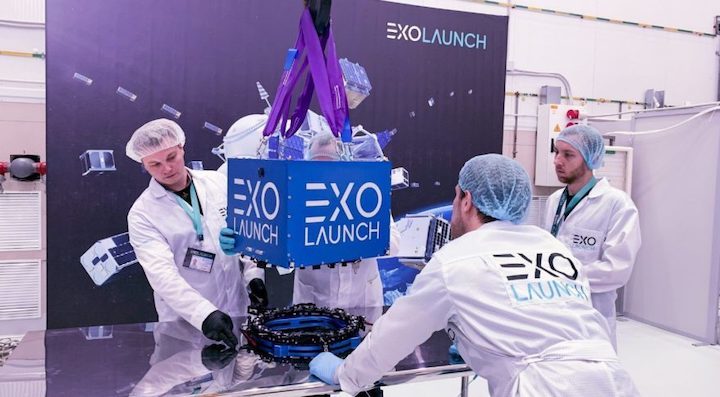13.04.2021

TAMPA, Fla. — German launch services provider Exolaunch is developing a line of eco-friendly space tugs called Reliant, designed to clean up debris after sending satellites to custom orbits.
Flight tests will start in the second half of 2022 on a SpaceX Falcon 9 rideshare mission with customer payloads, according to Exolaunch vice president of launch services Jeanne Medvedeva.
The German company, which has coordinated rideshare launches for more than 140 small satellites, said its orbital transfer vehicles (OTVs) will de-orbit within two hours after completing their mission in a first for the sector.
Flight qualification tests will initially be for “Standard” configuration of Reliant that will focus on moving satellites — after they have been deployed from a rocket on a set rideshare mission — to a custom orbit altitude.
Reliant Standard will be capable of lifting a satellite’s orbit from around 250-300 kilometers to 550 kilometers in one hour.
In 2023, the company plans to start testing a Reliant Pro configuration, which would be able to make additional adjustments including the inclination of a satellite’s orbit.
“There is an increased demand from our customers and the NewSpace industry for dedicated injection and custom orbit in their constellation deployment programs, but until now they’ve been limited to one orbit per launch,” Medvedeva said in a statement.
“Our space tug program will now offer customers multiple orbit options for smallsat deployments on any given mission, enabling wider access to space and diverse constellation launch strategies. It is also our contribution to the capacity-building of in-space logistics, a new emerging niche that is gaining value in the Exolaunch portfolio.”
Medvedeva told SpaceNews that developing the capability to raise a satellite’s altitude, and then adjusting its inclination, are the first two steps of its OTV plan.
The final step would be for the OTV to actively decrease debris in space, an increasingly important issue for the industry as the number of in-orbit satellites skyrockets — in part because of companies like Exolaunch.
After deploying satellites, modular payloads attached to the Reliant Pro could collect space debris before the OTV de-orbits.
“The goal is to bring down as much as we put up,” Exolaunch chief operating officer Alexander Kabanovsky said in the same interview.
Exolaunch is one of several companies developing OTVs to meet growing demand for more flexible and tailored small satellite launch services.
U.S.-based rideshare rival Spaceflight launched the first of a series of progressively upgraded Sherpa OTVs Jan. 24, as part of SpaceX’s record-setting Transporter-1 mission.
Called Sherpa-FX, the spacecraft carried 16 of the 143 small satellites on that launch.
While Sherpa-FX has no propulsion, two other OTV versions, Sherpa-LTC with gas propellant and Sherpa-LTE with electrical propulsion, are set to launch later this year.
Exolaunch was also one of several rideshare aggregators that coordinated payloads for the Transporter-1 mission, overseeing 30 satellites.
Medvedeva said it is coordinating about 30 of the satellites slated for SpaceX’s next dedicated rideshare mission, Transporter-2, around June.
She added that Exolaunch next plans to fully manifest the rideshare payload of a Soyuz-2 rocket launch out of Russia, slated for the October/November time frame, ahead of another mission with SpaceX in December.
In 2019, Exolaunch agreed to pay in-space transportation startup Momentus more than $6 million to move satellites in low Earth orbit in 2020 with a service called Vigoride, and from low Earth to geosynchronous orbit in 2021 with Vigoride Extended.
Vigoride’s operational debut had been slated for SpaceX’s Jan. 24 Transporter-1 mission but was pulled off that launch after delays in completing an interagency review.
Exolaunch said it terminated the agreement with Momentus in 2020 when it became apparent that expected timing parameters would not be met. The company added there is now no contractual relationship between Exolaunch and Momentus.
Momentus has been coming under U.S. government scrutiny as it plans to merge with Stable Road Acquisition Corporation, a special-purpose acquisition company (SPAC), to trade on the Nasdaq stock exchange in a deal valuing it at about $1 billion.
The startup’s Russian founders said March 8 they have placed their shares into a voting trust, to be sold in the next three years, amid efforts to address U.S. government concerns about its foreign ownership.
Quelle: SN
